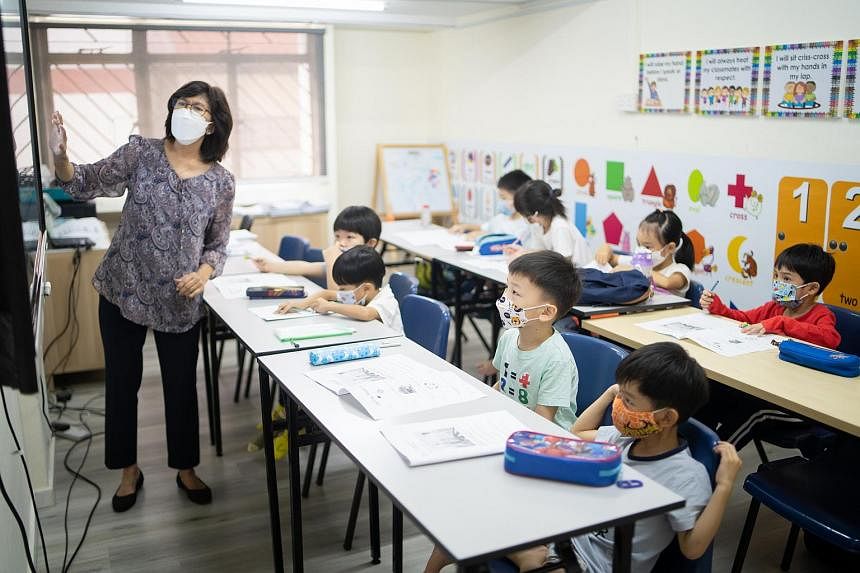Tuition centres enrolling more young pupils, even those aged 4

SINGAPORE - Their school examinations are still many years away but children as young as four are going for tuition, with centres offering lessons in specialised after-school programmes.
The classes cost between $30 and $100 for each session lasting 60 to 90 minutes.
Teachers and tutors told The Straits Times there is a rise in demand for tuition among kindergarteners. Tuition centres said they are catering to parents who to prepare their children for primary school while others said their children need tutoring to keep up with their peers.
Ms Murni Abdul Hamid, 38, director of Brainybunch International Montessori Kindergarten and Childcare, said: "In 2010, about 30 per cent of kids in a class of 25 would attend tuition, but in 2022, it's about 70 per cent."
The centre currently has more than 400 pupils between 18 months and six years old.
Madam Doreen Ng, 39, an administrative officer, said she started sending her six-year-old son for English and mathematics tuition classes three months ago when she realised he could not spell and read as well as his elder brother could at the same age.
"I don't want him to be laughed at by other children if he can't read or write as well as them. He once said to me 'tuition is too hard, can I please stop?', but these classes will help him so that he won't have much difficulty in Primary 1."
Parents said tuition helps as their children receive a level of attention that kindergartens are unable to offer. At centres such as The Learning Lab and AGrader Learning Centre, there are five to 12 children per teacher while at pre-schools, it stands at an average of 25 pupils to one teacher.
Madam Norzila Wagimin, 45, a primary school teacher, said she sent her six-year-old daughter for English tuition when she noticed her struggling to recognise letters and phonics.
"The classes were able to give her more attention and hence work on her weak areas more effectively."
Ms Humaira Ali, 24, a pre-school teacher, said: "As a kindergarten teacher, there's so much more that I have to do on top of teaching. We give the best that we can to the pupils, but we're stretched too thin to give each child as much attention as a tutor can."
Ms Lee Sue Lynn, academic director for early years and lower primary at The Learning Lab, which offers mathematics and English preparatory courses for those aged four to six, said its main goal is to prepare the children for Primary 1.
She said Singapore parents are set on preparing their children for PSLE as soon as possible, viewing it as a milestone in a child's life here.
A session at The Learning Lab can set parents back by up to $100 for a 90-minute session.
But parents are willing to pay, as they see tuition as almost a need for their children to keep up.
Mr Muhamad Faisal Abdul Rahman, 39, a secondary school science teacher, sends his six-year-old for English, mathematics, Malay and Arabic preparatory tuition classes. He plans on sending her to a madrasah school, but she will first have to pass an entrance test.
"A lot is expected of children nowadays. It's quite stressful for everyone involved but we understand the need to maintain a benchmark of academic achievement."
The Ministry of Education (MOE) cautioned that preparing children to be ahead of the academic game could be detrimental to the child in the long term.
An MOE spokesman said: "When children are over-prepared academically, they may be learning knowledge and skills that are not developmentally appropriate, and have less time for other important aspects of child development."
MOE removed all weighted assessments and examinations for Primary 1 and 2 pupils in 2019. Non-graded assessments such as quizzes, and worksheets are used to gauge their understanding instead.
But the centres said the mindset of preparing children early to help them attain good grades is not one that will disappear overnight.
Ms Lee said: "The desire for a place in primary schools traditionally perceived as elite or good in the minds of parents is likely to remain high for the time being."
Mrs Seri Fong, 34, a private kindergarten tutor, said: "Yes, there are no more exams in P1, but it's simply been replaced with quizzes... and parents still compare their children's performance. In this way, not much has changed at all and the pressure to succeed still exists."
However, experts like Ms Geraldine Susay, 48, an early childhood expert who coaches kindergarten principals and teachers in developing curricula for pupils, warned about stress.
"They're often unable to express themselves well at this age, so while we're teaching them all this advanced material, we are not teaching them how to deal with the stress that comes with this process."
Dr Annabelle Chow, a clinical psychologist who runs the practice Annabelle Kids, said she has seen seven-year-olds who were anxious because of the pressure to succeed academically. Taking time away from play for tuition can also affect children's social development.
Dr Chow said: "When young kids don't have sufficient opportunities to play, they lack the skills to navigate relationships and conflict when they enter primary school and get to the workforce."
Ms Susay, who was a childcare centre principal for 10 years, said: "Some lose the ability to imagine and be as creative as they once were because they're so exhausted all the time."
As children learn through play, putting them in structured learning environments too early can affect their curiosity and interest in learning for the long term, she added.
For some parents like Mrs Angela Lim, 36, who sends her four-year-old child for Chinese enrichment classes, it is not all about the results. "It's about making language easier and more intuitive for the kids," she said.
Still, the dilemma between preparing one's children for primary school early and letting them progress at their own pace grips parents like Mr Muhamad Faisal.
He said: "In an ideal world, kids get to be kids, and there would be less emphasis on testing. Not many of us wish to send our kids for tuition but we don't have the time and capacity to prepare them ourselves either."
Ms Susay said: "Think about the sort of memories you want your children to have. Let them grow at their own pace - no need to be ahead of anybody. Children must be children, it's a right they're entitled to."
Join ST's Telegram channel and get the latest breaking news delivered to you.




No comments:
Post a Comment